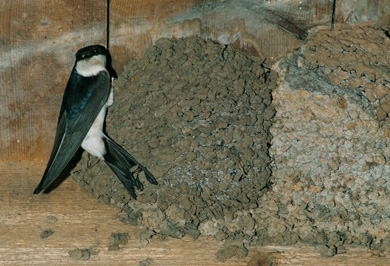It’s that time of year again when we see and hear birds building nests in preparation for the breeding season.
One such bird is the aptly named house martin. House martins are often seen building their homes on the sides of houses or farm buildings, usually located just under the eaves in a sheltered corner, or on a southerly facing wall, to get the warmth of the sun.
[caption id="attachment_55409" align="alignleft" width="390"] A house martin completes its nest. (Photo by John Markam).[/caption]
A house martin completes its nest. (Photo by John Markam).[/caption]
A house martin nest is painstakingly made from hundreds if not thousands of clumps of wet mud, and mixed with straw and grass to make a closed cup shape, with just a small hole for getting in and out of. Adult birds will fix their nests and add to them and house martins can use the same nest year after year. House martins arrive here fairly late in the breeding season, toward the end of April, and they can have up to three broods during the summer. With their late arrival and lots of chicks to raise, the young can be seen feeding on insects as late as October. The adults and young fatten up before they fly back to Africa, where they spend the winter.
House martins are amber-listed on the Birds of Conservation Concern in Ireland list, meaning they are of medium conservation concern, so it is really important that their nest sites are protected.
However, RSPB Northern Ireland and the Northern Ireland Environment Agency (NIEA) often receive calls in the summer from householders who are worried about house martins building muddy nests on their homes, or from businesses who think they need to get rid of the nests for health and safety reasons. RSPB NI and NIEA are part of the Partnership for Action against Wildlife Crime (PAW), a coalition of organisations working together to reduce wildlife crime by raising public awareness and promoting effective enforcement.
PAW NI has stressed that house martin nests are only used for a few months each year and they pose no harm to human health.
If a nest is in use, it is protected by our wildlife law and can’t be removed. Anyone doing so risks being prosecuted for a wildlife crime, which carries a maximum sentence of up to six months imprisonment and/or or a £5,000 fine.
If you suspect a wildlife crime has been committed, please report it to the PSNI on 101. Alternatively, contact Crimestoppers anonymously on 0800 555 111.
For more information about nesting birds and the law, visit:
and search ‘wildlife crime’.]]>























